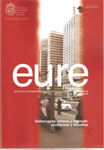La democracia en el filo de la navaja: límites y posibilidades para la implementación de una agenda de reforma urbana en Brasil
DOI:
https://doi.org/10.4067/S0250-71612009000100001Palabras clave:
participación ciudadana, planificación urbana, política urbanaResumen
Los años '90 representaron en Brasil avances institucionales en el campo del Derecho a la Vivienda y el Derecho a la Ciudad; en el reconocimiento de los derechos de millones de habitantes de los asentamientos urbanos informales y en la participación directa de estos ciudadanos en los procesos de toma de decisiones sobre la política urbana. Estas propuestas constituyen los pilares de la Agenda de Reforma Urbana, que a partir de la creación del Ministerio de las Ciudades durante el gobierno de Lula, ingresa en el ámbito del Poder Ejecutivo federal. El artículo evalúa los límites y las posibilidades de implementación de esta agenda a través de la trayectoria de dos políticas propuestas por el Ministerio: el Consejo Nacional de las Ciudades y la Campaña por los Planes Directores Participativos; centrando su análisis en la organización del Estado en el área de desarrollo urbano en su relación con el sistema político y las características de la democracia brasileña.
Descargas
Publicado
Cómo citar
Número
Sección
Licencia
Derechos de autor 2009 Revista EURE - Revista de Estudios Urbano Regionales

Esta obra está bajo una licencia internacional Creative Commons Atribución 4.0.
Al momento de aceptar la publicación de sus artículos, los autores deberán formalizar la cesión de derechos de autor a EURE, según las condiciones establecidas por la Revista.
Ésta establece que el autor autoriza a EURE de manera gratuita, exclusiva e ilimitada a reproducir, editar, publicar, distribuir, publicitar, comercializar y traducir el artículo, a cualquier soporte conocido o por conocer y desarrollar.
Del mismo modo, los autores aseguran que el artículo propuesto es original, no publicado y no propuesto para tal fin a otro medio de difusión.


